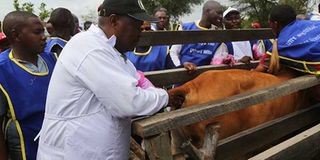Over 100,000 Kitui farmers to to get new livestock breeds

Kitui Deputy Governor Wathe Nzau, a veterinary doctor, administers artificial insemination to a cow at Mbitini market in Kitui Rural Constituency on January 17, 2019. The county government is providing free semen and livestock reproductive services to 10,0000 households in a bid to improve beef and milk quality. PHOTO | KITAVI MUTUA | NATION MEDIA GROUP
What you need to know:
- Dr Nzau said the programme will help local farmers earn more money from technology-based livestock keeping.
- The deputy governor said the county plans to have about 250,000 cattle fertilised between now and March.
- The production of the calves is timed to coincide with November rainy season when there will be plenty of pasture.
More than 100,000 households in Kitui County will benefit from a technology-based livestock improvement and multiplication programme through mass breeding.
The target beneficiaries – majority who keep traditional cattle – will have their animals artificially inseminated for free in order to progressively improve the quality and quantity of beef and milk they produce.
The plan which was launched Thursday at Mbitini market in Kitui Rural Constituency will use scientific methods to synchronise animals to get on heat at the same time and then administer mass artificial insemination.
According to Kitui Deputy Governor Wathe Nzau, the county has adopted a synchronisation method that manipulates a herds' ovulation cycle and induces a large number of females to be on heat in a short, predetermined time.
MORE MONEY
Dr Nzau – a veterinary doctor by training – said the programme will help local farmers earn more money from technology-based livestock keeping while in future opening a new front for wealth creation and fighting poverty.
"When the manipulation is achieved by inducing hormones, it biologically triggers a new fertilisation schedule where mass artificial insemination can be administered to hundreds of cows that are prepared for conception," Dr Nzau explained to Nation after presiding over the launch of the project.
The deputy governor said the county plans to have about 250,000 cattle fertilised between now and March this year across all the 40 wards in Kitui with the hope of producing the same number of calves in October.
"The dams (mothers of calves) will be the animals owned by Kitui farmers while the sire bulls will be through selected semen straws from Kenya Animal Genetic Resources Centre (KAGRC- Kabete)," he said.
PASTURE
The production of the calves is timed to coincide with November rainy season when there will be plenty of pasture.
South Eastern Kenya University is providing the technical support by doing the breeding trials at its main campus, training hundreds of inseminators for the county and developing dry land pasture seeds.
Dr Nzau said the main objective of the programme is to produce both pure and cross-breed dairy animals from the local dairy herds and the local indigenous Zebu and Boran cattle herds.
"This programme aims at changing the traditional livestock kept in Kitui by locally producing cross-breeds of Friesian, Guernsey, Jersey, Brown Swiss, Boran and Sahiwal among others that can cope with the county's climatic conditions," said Dr Nzau.
MILK SUPPLY
He said in two years, this will enable livestock farmers to compete on equal basis or even better with those from other parts of Kenya.
According to county livestock statistics, Kitui has about 401,265 head of cattle and only 6,685 are good dairy cattle, making the county heavily deficient in milk supply for domestic and commercial consumption.
County Agriculture Executive Emmanuel Kisangau said the county government has purchased semen of the listed breeds on behalf of farmers and will deploy enough livestock extension officers to carry out the insemination.
"If each of the 60,000 livestock keeping households in Kitui can produce only five litres of milk per day, that would be 300,000 litres per day. If it retails at Sh50 per litre it would fetch Sh15 million per day, Sh 450 million per month and Sh5.4 billion annually," Mr Kisangau said.





